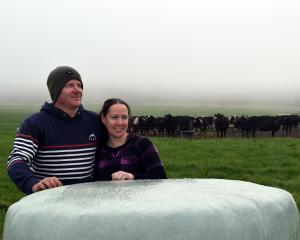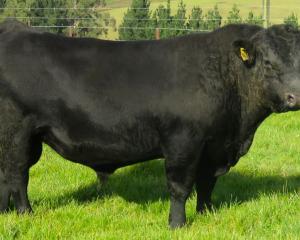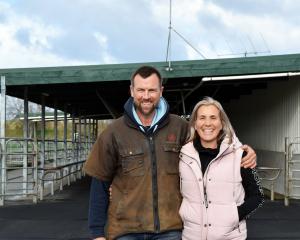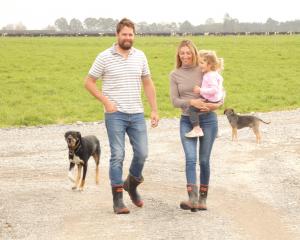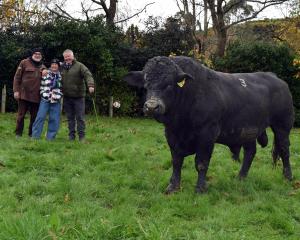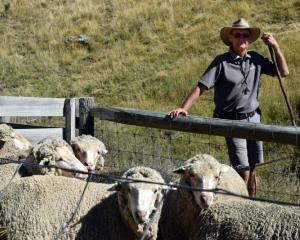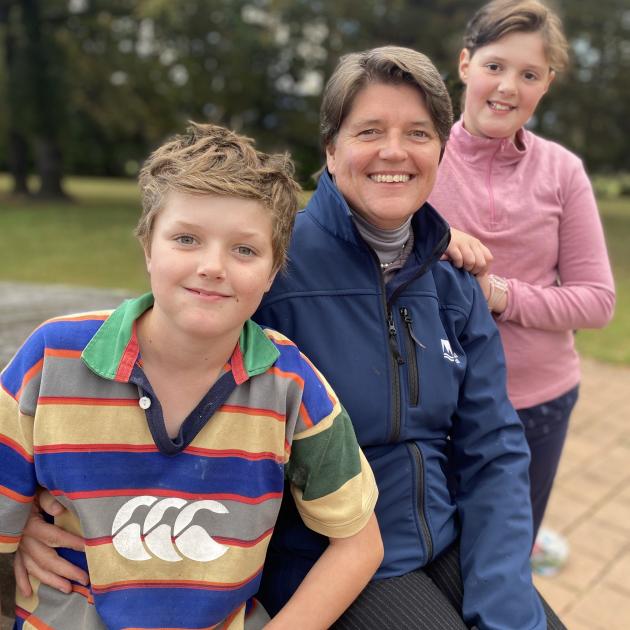
Living quite literally on a farm called Roadesende, Alistair and Carmen Hope are tucked into the eastern end of the Strath Taieri valley.
The bus stop is the best part of a 16km return drive morning and afternoon to get their children, Henry and Alice, off to school and home again, and the closest shop for a bottle of milk is a good 25km away.
The Hopes farm 8000 stock units on their 1900ha property. Like the rest of the valley, Roadesende is experiencing drought-like conditions and Alistair is feeding out seven days a week to keep their sheep in tip-top condition pretupping.
Farming is a relentless game and to have one half of the partnership working off-farm takes a huge level of organisation and communication.
Carmen Hope is in the second year of her second term on the Otago Regional Council. Representing the Molyneux constituency, she agrees it has been a “hugely challenging” time for farmers and a critical time for councillors to show the people what they are made of.
“For me, it’s been about listening, listening and more listening.”
The steam train that was the Government’s Essential Freshwater Proposal in 2019 was the shot in the arm for some farmers who, before then, had been somewhat apathetic towards the council.
The 2019 election was a much harder sell to voters who turned out to assorted events in big numbers to find out what their potential councillors were going to do for them.
“It was a very tough election and I certainly had to work for every vote. The mood was very different,” she said.
When Covid-19 hit, Carmen said it was her personal view that the land use rules the Government was trying to bring in “so quickly, like they wanted it done yesterday”, had to be put on pause.
“My own view was that it all just needed to take a breather. Here we had farmers who had so much uncertainty coming at them from every angle — from feed shortages, to cancelled stock sales and processing plant shutdowns — the last thing they wanted to worry about was a one-size-fits all rule book that they didn’t get a fair chance to consider and be properly consulted on.
‘‘Farmers are already doing the good work; the practices are being put in place and that takes time.”
Carmen (nee Knowler) grew up as the youngest of five children on a sheep and beef farm in Clifden, Tuatapere. Coming from a “good, Catholic family”, she attended Moreau College for girls in Dunedin. In sixth form, her school amalgamated with St Paul’s High School for boys to become Kavanagh College and the following year she was made head girl.
Three years of Hotel Management School was a good start for her.
“It was quite a prestigious course that only took 12 people every three years and it gave me a very good grounding.”
A completely different career change presented an opportunity that would span 12 years of working in a male dominated industry, not only qualifying as a drainlayer but holding a C grade Water Treatment Certificate.
“It does seem like a very strange career choice for a young lady, but it opened up a lot of doors for me. I applied for a fabulous job and a not-sofabulous job for the Dunedin City Council and I got the latter,” she said, laughing.
Her first role as assistant seepage control officer would ensure that no two days were ever the same.
“Conflict resolution was a big part of my job.”
A prestigious Winston Churchill Fellowship (complementary to a Nuffield Scholar in the rural world) to research and investigate drainage practices throughout the United Kingdom, Singapore and United States has been invaluable and still pertinent 20 years on.
After the DCC, Carmen looked after apprentices for the Plumbing, Gasfitting, Drainlaying and Roofing ITO, and also undertook moderation for Drainlaying — which she still does. She also marked papers for the Open Polytechnic and the Plumbers, Gasfitters and Drainlayers Board. All the while, her Winston Churchill Fellow mentor and Otago regional councillor, Louise Croot, was quietly reminding her about the greater good for Otago and encouraging her to stand for council.
Now into her fifth year on the regional council, the work-life balance on a busy farm that is relatively remote brings its own set of challenges; juggling homework, making meals and reading council papers.
“Alistair is amazing and very supportive of my job. He is pleased that I am frequently away, so he can eat what he likes,” she laughed.
“I see it as an important part of my role to attend events and be visible and to listen,” she said.
Carmen plans to stand again in next year’s council election. “This term I have been on the council, the meetings have been more frequent and the technical nature of the papers extremely complex. The key has been to stay true to myself and always be approachable,” she said.


